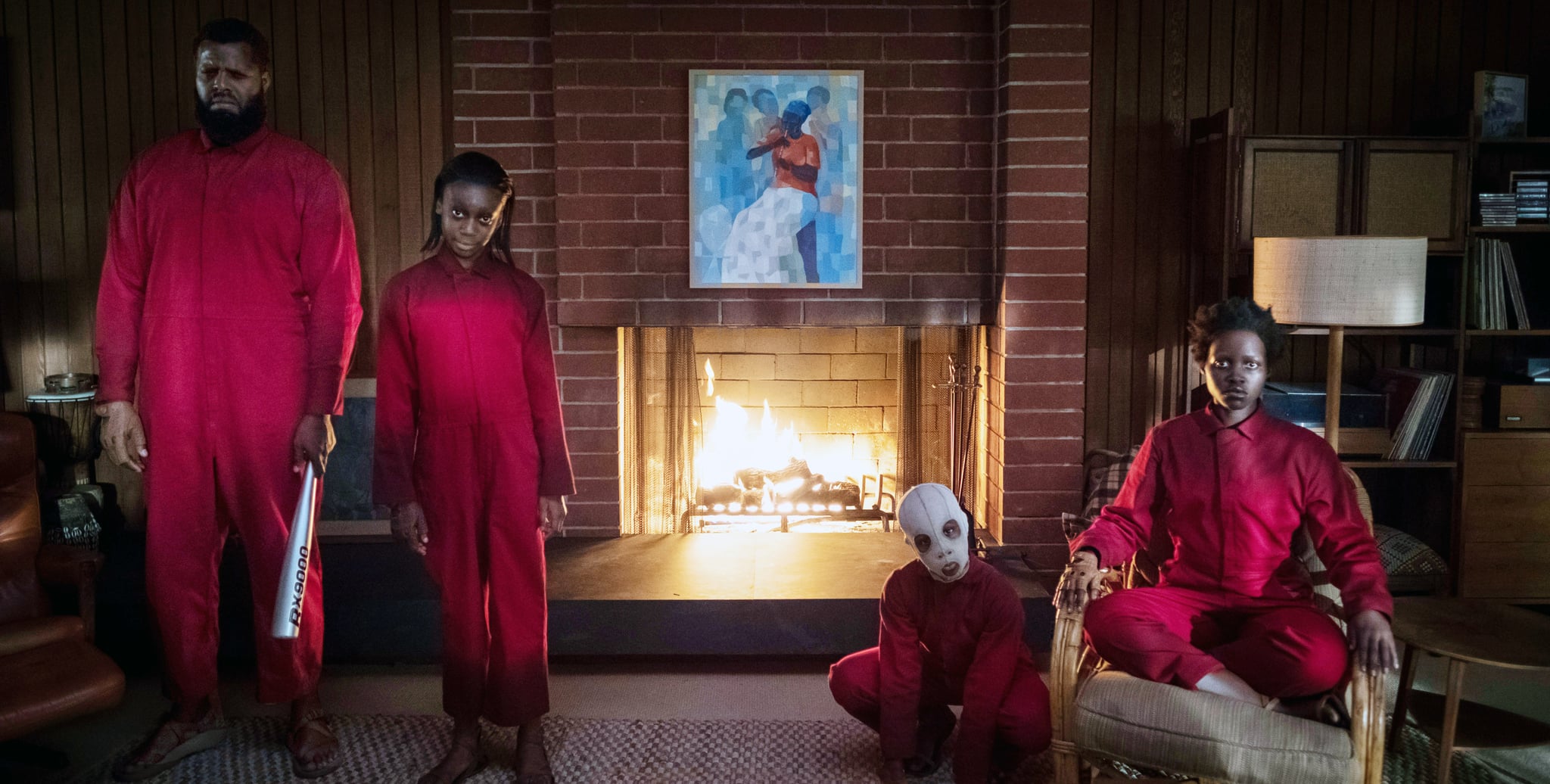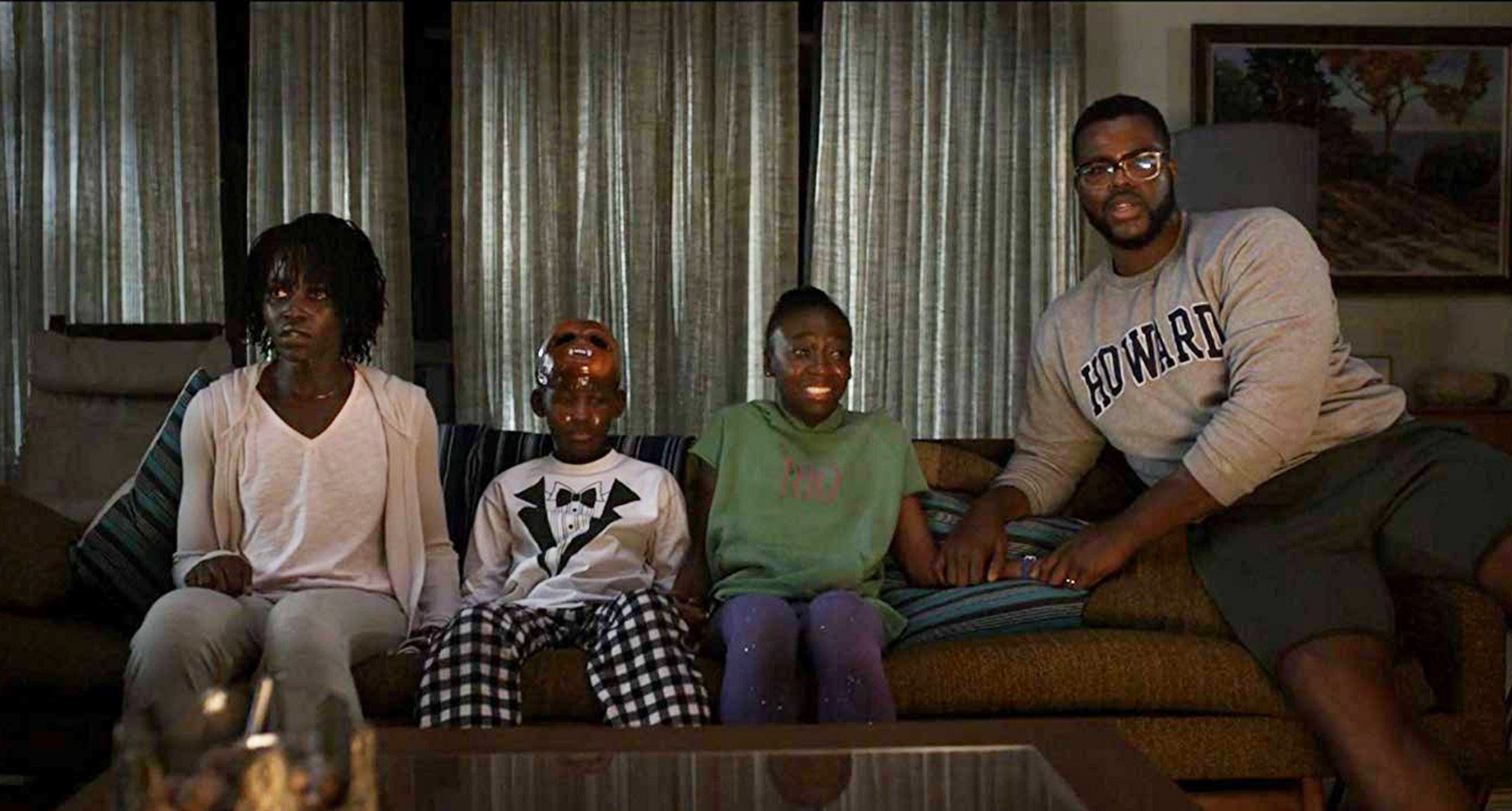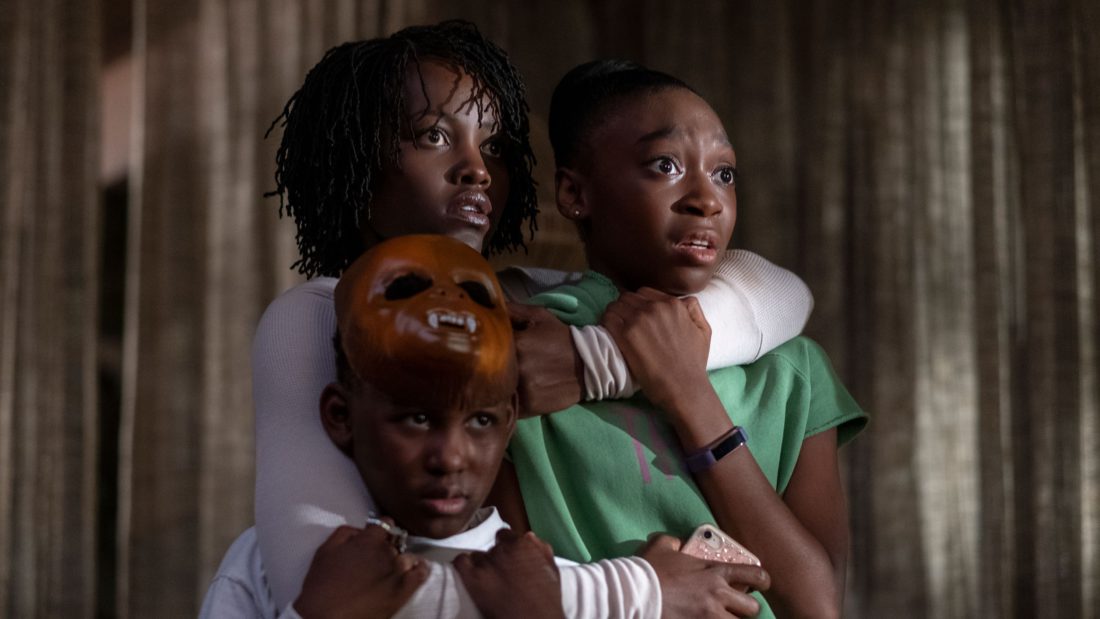Ali McGhee: While I was watching Us, which centers on a family attacked by people who look just like them, I couldn’t stop thinking about a Jorge Luis Borges story, “Fauna of Mirrors.” It’s about a race of beings that live as our reflections inside mirrors. A prophecy mentioned in the story states that one day they’ll rebel and break free. I also thought a lot about the novella The Tain by British author China Mieville, about what happens after our enslaved reflections finally reassert control and start picking us off.
Melissa Williams: That’s pretty fascinating since, as I watched, I started ruminating about how many windows and mirrors I have in my house and was freaking out a bit. My initial feeling is that writer/director Jordan Peele’s debut Get Out was a more frightening movie, but Us is scarier — as in jump scares-scary. Also, it’s kind of gross.
I’m still trying to figure out the meaning of Us’ doubles and their motivation beyond main character Red (Lupita Nyong’o). Was she their leader? Do the doppelgängers go after everyone or just their look-alikes? Also, what about all those rabbits? And did you notice the son, Jason (Evan Alex), wears a mask all the time? (I can only assume Peele was into Friday the 13th.) There are layers and layers and layers to this movie, but I don’t know if my psyche can take another viewing anytime soon, even though I’m on the edge of my seat to hear Peele’s feature commentary on the DVD. The storytelling, overall, was not on par with Get Out, but it was still fun to watch. Lupita was amazing as both Red and human matriarch Adelaide Wilson.
Ali: Related to that, I felt like while race/racism wasn’t as obvious within the surface narrative as it was in Get Out, the film was very much about enslavement and what happens to people who are completely oppressed/repressed. What do you think?
Melissa: I didn’t think racism was a focus in this movie at all, although I think the black experience was certainly uplifted in a few ways. First, I can’t recall a big-screen movie (certainly not with this kind of budget and buzz) that features a black family who all have dark skin and are so beautifully lit. After Black Panther, there are no excuses for not lighting black skin appropriately, let alone when you have people as stunning as Lupita and Winston Duke on the screen. Most of the time, Hollywood and the TV industry give us black families with dark-skinned men who have much lighter-skinned wives and daughters. It’s an actual trope that I’ve always found disturbing.
Also, the music — Luniz’s “I Got 5 on It,” a beloved hip-hop classic that was turned into a creepy doppelgänger of its own — the daughter named Zora (Shahadi Wright Joseph) and even the Howard University sweatshirt that Gabe (Duke) wore for second half of the movie are all grounded in a black experience that I totally relate to.

Ali: Yes, yes, yes – and I just wanted to add here that I thought this was a gorgeous movie to look at the whole time.
What did you think about the movie’s treatment of appropriation and simulacra? Throughout the film, the Wilsons’ white friends, the Tylers, echo and simulate memories, events and meanings — just as echoes and simulations are a larger part of the plot overall. The Black Flag T-shirt worn by the Santa Cruz midway employee in the film’s 1986 prologue is presumably from an actual concert, and though one of the twin teenage Wilson daughters’ Black Flag shirt later echoes it in the present-day storyline, hers is likely from a store that deals in reproductions. Another example is when Kitty Tyler (Elisabeth Moss) shows Adelaide the image of the white woman wearing a headdress in a magazine and says, “Isn’t this beautiful?” Later, her husband Josh (Tim Heidecker) wears a robe with Native American designs on it that he presumably knows nothing about.
Melissa: I honestly didn’t think too much about the other family, even though I thought the parents were well-played. I’m a fan of Moss in just about anything. As soon as they came on screen, I thought they’d be villains or doomed Star Trek “red shirts” — symbology that’s consistent here. The dad in his robe looked like The Dude to me, so I guess that means I saw him as kind of ridiculous. (No offense to Jeff Lebowski, whom I love!) As for T-shirts, having Adelaide wear a “Thriller” shirt was pretty cheeky.
Ali: The Tylers were interesting characters in that they didn’t really command much attention or thought, as paradoxical as that sounds. I think most of the audience will probably experience either not really caring about them or actively disliking them. It’s interesting that the only character who finds them appealing is Gabe, who has sort of a “keeping up with the Joneses” attitude when it comes to Josh.
The funhouse/house of mirrors at the midway is also appropriative — initially appropriating indigenous shamanic traditions that are later (barely) covered up by the “Merlin” sign — but it’s still also somehow a place of power and (pretty nefarious) magic, which is interesting.
Melissa: Carnivals are inherently creepy to me, so the nefarious thread was there immediately. The double version we see late in the film is only slightly less creepy to me than the real thing. That may have been intentional because both settings are pretty macabre. Also of note to me was Red’s voice. It reminded me of Toni Morrison’s character “Beloved,” the embodied spirit of the protagonist Sethe’s murdered daughter. In the novel by the same name, Sethe kills her baby, whom she calls Beloved, rather than allowing her to be sold into slavery. Beloved’s voice is very much like Red’s. I don’t think there’s a connection between the two, but hearing the voice Lupita gave that character — another young woman who was trapped between life and some shadow of life — struck me as being like the one Morrison imagined for Beloved in her book.
Ali: Oh, wow! This is a striking observation, and I think it works so incredibly well here. I think it’s a real #micdrop moment for this review. I’ll just add that I thought the voice of Red and the sounds the other doubles make, along with their movements, were incredibly uncanny – just off enough that they could still pass as (mostly) human, but totally wrong.
Also, what did you think about the spider references? Spider-Woman and spider references made me think of Anansi, plus Athena and Arachne as well as the Fates, who spin, measure and cut people’s lives like yarn.

Melissa: I wondered about the spider that seemed to be crawling out of a ceramic spider, as if it had its own double. But I didn’t see it or perhaps just didn’t follow it as a thread throughout that I could make sense of.
Ali: Adelaide seems to have a special relationship with, or at least an affinity for spiders – I’m thinking about the scene where she watches one cross the coffee table and looks at it curiously, even sympathetically. The spider’s web works well as a metaphor for connection between people and realms. It’s some of the strongest material on the planet, so it’s very hard to break, but it’s also often invisible. (I’m thinking about all the webs I’ve stepped into). Definitely more to think about here …
I also felt like the opening shot was genius. I loved peeking at the VHS tapes strewn around the TV – C.H.U.D (Cannibalistic Humanoid Underground Dwellers) and The Man With Two Brains are such fun nods to horror/sci-fi – and hints to the plot.
Melissa: The opening shot was pure genius, and it made me feel like a kid back in the ’80s again. It also reminded me a bit of the basement scene in Get Out. No way was using that old-school TV an accident here. And the rabbits — I need to know more about the rabbits! (Rabbit holes, anyone? Could it be that obvious?)
Ali: I wonder if the rabbits were the first doubling experiments before humans? So they just had to all stay down underground, too? Rabbits in cages just scream scientific testing to me — and also magicians, which, of course, link to the funhouse and to Jason and his double Pluto’s tricks.
And for viewers interested in what the beach bum’s Jeremiah 11:11 sign refers to, the King James Version of the Bible says, “Therefore thus saith the Lord, Behold, I will bring evil upon them, which they shall not be able to escape; and though they shall cry unto me, I will not hearken unto them.”
Melissa: I looked that up on my phone in the theater, as I expect many people did. I gave up all hope of a happy ending after that! And that ending — whoa! I wish we could talk about it more here without ruining for folks, but it was one of many reasons why I woke up in the middle of the night after I got home from the theater.




sitting thru that was an hour and a half; I’ll never get back…. hated it!